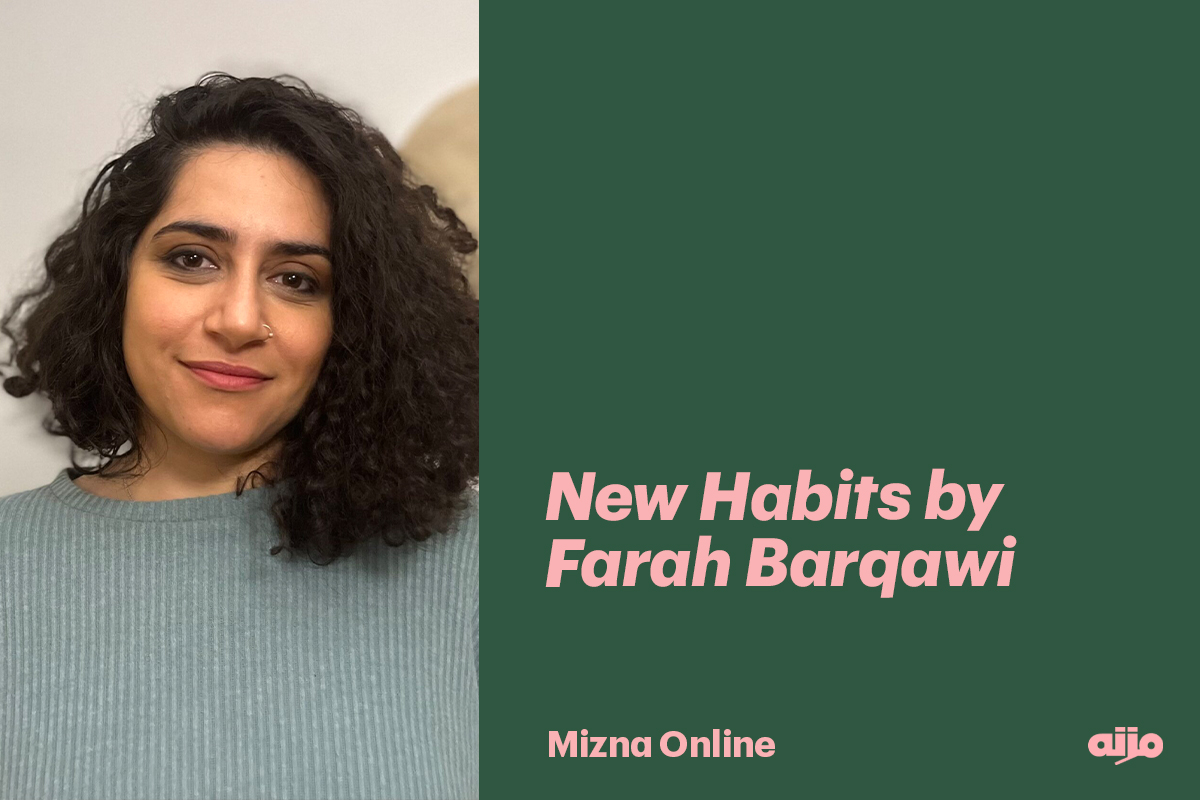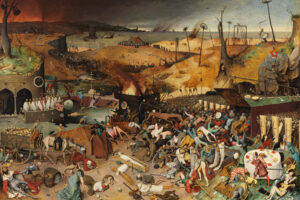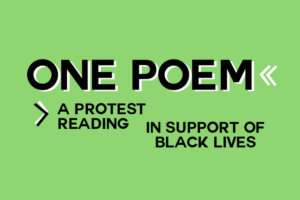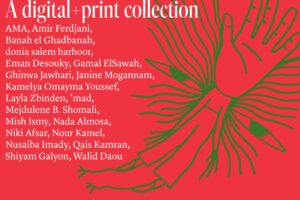
July 3, 2024
New Habits
trans. Sara Elkamel
November 12, 2023—Farah Barqawi’s written account of the early embodiments of witnessing the genocide on Gaza dates some eight months before Mizna’s publication of her text. It suffices to say that it could have been written yesterday—as if time itself refuses to look away. Free Palestine.
—Nour Eldin H., assistant editor
The massacre has reinstated a school-like system, where my mother is the teacher and I am the only student. I await her daily dispatches so I can edit and publish them. I get this homework done quickly, afraid any tardiness would disappoint the teacher.
—Farah Barqawi, trans. Sara Elkamel
New Habits
November 12, 2023
My mother was not the only one to pick up new habits as a massacre unfolded in Gaza, her beloved city, over the past month. I too was forced to acclimate to new activities in my distant exile in New York City. First: daily acrobatic leaps between two time zones, separated by seven long hours. Sleep is restless, and waking hours are tinged with sleep: I exist in limbo. Nothing but her survival, and the survival of those sheltering with her, will allow me to escape. No light can enter this void until the sun rises where she is. Only then can I fasten my eyes, briefly, before waking back up to be with her.
Second: disarray and destruction. In other words: a clear lack of demarcation between where I eat and where I sleep, between my outside and inside clothes, and a deliberate carelessness towards the state of my room, my closet, my kitchen, and my backpack. The destruction I witness across the screen, and which continues to assault my mind and heart, has prompted a newfound apathy towards any and all appointments, plans, and details.
Third: a new morning routine. The massacre has reinstated a school-like system, where my mother is the teacher and I am the only student. I await her daily dispatches so I can edit and publish them. I get this homework done quickly, afraid any tardiness would disappoint the teacher. When I complete the task, I eagerly await a gold star on my forehead, or a “God bless you,” or “Bravo, onwards!” inscribed in my notebook.
But on days like today, when there is no contact or communication—no writing, no editing, no homework, no gold stars—I am overcome with the nagging feeling that I must have forgotten to do my homework. If only my mother could cover for me; keep the teacher from knocking off any marks. To console myself, I remind myself that it is the weekend, and that the teacher is my mother. Once she returns to the classroom, there is no doubt that she will assign me more homework, which I will break my neck to deliver by the deadline.
برزخ
١٢ نوفمبر/تشرين الثاني ٢٠٢٣
بقلم: فرح برقاوي
ليست أمّي وحدها من ربّت عاداتٍ جديدةً في شهرٍ وأكثر من المجزرة في مدينتها العزيزة غزّة. مثلها أنا، اضطررت إلى اعتياد أشياءٍ جديدة في منفاي البعيد في نيويورك. أولها القفز البهلواني بين توقيتين تفصلهما سبع ساعاتٍ طوال، فلا يكون النوم نومًا ولا الصحو صحوًا، بل أعيش في برزخٍ؛ لا خروجَ منه إلا بنجاتها هي ومن معها، ولا ضوءَ فيه إلا عندما تشرقُ الشمسُ عندها، فأغمضُ عينيّ قليلًا قبل أن أواصلَ الصحوَ معها
ثانيها كان الكركبة والدمار؛ فالدمارُ الذي أراه على الشاشة، هو ذاتُ الدمار الذي يضرب ذهني وقلبي، ليخرجَ منّي بعدمِ اكتراثٍ مفاجئ لأيٍّ من المواعيد والخطط والتفاصيل، وبإهمالٍ مُتعمّد لمواضعِ الأشياء في غرفتي وخزانتي ومطبخي وحقيبتي، وخلطٍ واضحٍ بين مكان النوم والأكل، وثياب المنزل والخروج
ثالثها روتين الوظيفة الصباحية. أعادتني المجزرة إلى نظامٍ مدرسيّ، أمّي فيه المعلّمة وأنا التلميذة. أنتظر رسالتها اليومية – وظيفتي اليومية – لأحرِّرها، وأسرع في حلّ الواجب حتى لا أتأخّر فأخيّبَ ظنّها، وحين أنتهي أنتظرُ منها نجمة ذهبيّةً على جبيني، و “رعاكِ الله” أو “برافو، إلى الأمام” على دفتري لأتأكد من تفوُّقي
لكن أيّامًا مثل هذا اليوم، حيث لا اتّصال ولا تواصل، ولا كتابة ولا تحرير، ولا وظائف مدرسية وأنجُم ذهبية، أشعر بأنني لا بدّ نسيت واجبي اليومي وأريد من أمّي أن تشفع لي عند معلّمتي كي لا أخسر بعض العلامات، ومن ثم أقول لنفسي بأنه الجمعة، يوم العطلة الأسبوعية، وأتذكر بأنّ معلّمتي ذاتها أمّي، وأنه لا بدّ وأن أتلقّى مهمّةً جديدةً حين تدخل إلى الفصل مجدّدًا، وأنني سأحاول قدر المستطاع أن أسلّمها بحلول الموعد النهائي

Farah Barqawi is a Palestinian writer, educator, performer, and feminist organizer. Her work has appeared in multiple languages, both online and in print. She holds a master’s degree in public policy from University of Chicago and an MFA in creative nonfiction writing from New York University. Farah lives between New York City and Berlin.

Sara Elkamel is a poet, journalist and translator based in Cairo. She holds an MA in arts journalism from Columbia University and an MFA in poetry from New York University. She is a Pushcart Prize winner, and is the author of the chapbook Field of No Justice (APBF & Akashic Books, 2021).

Toward a Free Palestine: Resources to Learn About and Act for Palestine
We are proud to present this text as part of a list of resources to take action for and learn about Palestine, as well as works by Palestinian artists, writers, activists, and cultural workers.












